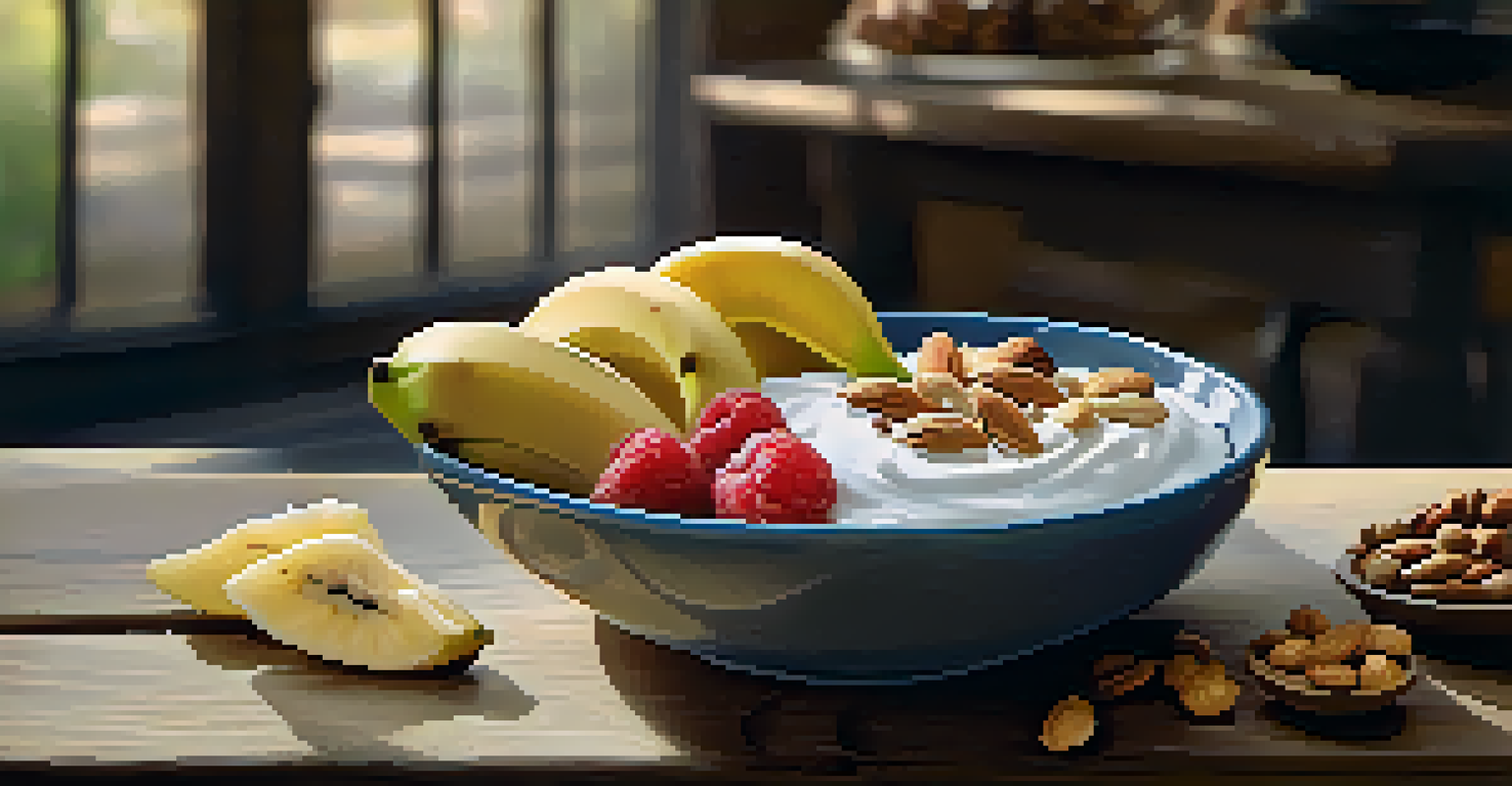How Diet Affects Sleep Hygiene: Foods to Avoid Before Bed

Understanding Sleep Hygiene and Its Importance
Sleep hygiene refers to a set of practices that promote consistent, restful sleep. It encompasses various habits and environmental factors that can enhance or disrupt your sleep quality. The importance of sleep hygiene cannot be overstated, as it affects our physical health, mental clarity, and overall well-being.
The best bridge between despair and hope is a good night's sleep.
Good sleep hygiene creates a foundation for a healthy sleep cycle, helping you wake up feeling refreshed and ready for the day. When we prioritize sleep hygiene, we can improve our mood, cognitive function, and even our immune system. It’s essential to recognize that what we consume can significantly influence this vital aspect of our health.
One key factor in maintaining good sleep hygiene is our diet. Certain foods can interfere with our ability to fall asleep, stay asleep, and wake up feeling restored. Being mindful of what we eat, especially in the hours leading up to bedtime, is crucial for optimal sleep.
The Role of Diet in Sleep Quality
Diet plays a pivotal role in regulating our sleep patterns. The nutrients we consume can influence the production of sleep hormones like melatonin and serotonin, which are essential for a good night's rest. A balanced diet helps maintain our overall health, but it also has direct implications for our sleep quality.

Certain foods can either promote relaxation and sleepiness or trigger wakefulness and restlessness. For instance, while carbohydrates can sometimes aid in sleep, high sugar intake can lead to energy spikes that disrupt our sleep cycle. Understanding these dynamics can empower you to make better dietary choices for improved sleep.
Diet Affects Sleep Quality
What we eat directly influences our sleep patterns, making it essential to choose foods that promote restful sleep.
Additionally, the timing of our meals matters. Eating too close to bedtime can lead to discomfort and indigestion, making it difficult to drift off. By being aware of how our diet impacts our sleep, we can establish healthier routines that benefit our rest.
Caffeine: A Sleep Stealer
Caffeine is perhaps the most notorious sleep disruptor. Found in coffee, tea, chocolate, and many soft drinks, it acts as a stimulant that can keep you wide awake long after your last sip. Even if you feel fine after consuming caffeine, it can linger in your system, affecting your sleep quality hours later.
Sleep is the best meditation.
To ensure restful sleep, it’s best to limit caffeine intake, especially in the afternoon and evening. The half-life of caffeine can last anywhere from three to seven hours, meaning that a late afternoon coffee can still be impacting your sleep at midnight. Being mindful of your caffeine consumption can be a game-changer for your sleep hygiene.
Consider alternatives like herbal teas or decaffeinated beverages in the evening. These options can help soothe your mind and body, preparing you for a restful night without the jittery effects of caffeine.
Alcohol: A Double-Edged Sword
While many people believe that alcohol helps them fall asleep faster, the reality is often more complex. Alcohol can disrupt your sleep cycle, leading to lighter sleep and more awakenings during the night. This can leave you feeling groggy and unrefreshed in the morning.
In moderation, alcohol may initially make you feel drowsy, but as your body metabolizes it, you may experience disturbances in your sleep patterns. This paradox can lead to a false sense of good sleep, masking underlying issues that could affect your health.
Caffeine Disrupts Sleep
Limiting caffeine intake, especially in the afternoon and evening, can significantly improve your sleep hygiene.
To enhance your sleep hygiene, consider limiting alcohol intake in the hours leading up to bedtime. Opting for non-alcoholic beverages can help you wind down without compromising your sleep quality.
Spicy Foods: A Recipe for Discomfort
Spicy foods can add excitement to meals, but they might not be the best choice before bedtime. Consuming spicy dishes can lead to indigestion and heartburn, making it tough to get comfortable and fall asleep. The last thing you want is to toss and turn due to a fiery dinner.
The body’s natural response to spicy foods often includes increased metabolism and body temperature, which can interfere with your ability to relax. It’s essential to give your body time to cool down before hitting the hay, and spicy foods can thwart that effort.
To foster better sleep hygiene, consider lighter, milder meals in the evening. Opting for soothing, easily digestible foods can help create a peaceful environment for sleep.
Heavy Meals: The Sleep Distraction
Eating heavy meals close to bedtime can significantly hinder your sleep quality. Large portions or rich foods require more digestion, which can lead to discomfort and restlessness. When your body is busy breaking down food, it’s less focused on providing you with restful sleep.
To promote better sleep hygiene, aim to finish eating at least two to three hours before bedtime. This gives your body the time it needs to digest and settle down, paving the way for a more peaceful night’s sleep.
Heavy Meals Impact Rest
Consuming heavy meals close to bedtime can lead to discomfort, hindering your ability to achieve restful sleep.
Instead of heavy meals, consider lighter snacks if you need something before bed. Foods like yogurt, bananas, or a small handful of nuts can satisfy late-night cravings without compromising your sleep.
Sugar: The Sleep Saboteur
Sugar may provide a quick burst of energy, but it can wreak havoc on your sleep. High sugar intake, especially before bed, can lead to energy spikes followed by crashes that disrupt your sleep patterns. This rollercoaster effect can make it challenging to maintain a restful sleep cycle.
Moreover, sugary snacks can cause inflammation and may even contribute to sleep disorders over time. It's no surprise that a diet high in sugar is linked to poorer sleep quality, leaving you feeling tired and sluggish the next day.

To enhance your sleep hygiene, consider swapping sugary snacks for healthier alternatives. Fruits, nuts, or whole grains can satisfy your sweet tooth while providing lasting energy without the sleep disruption.